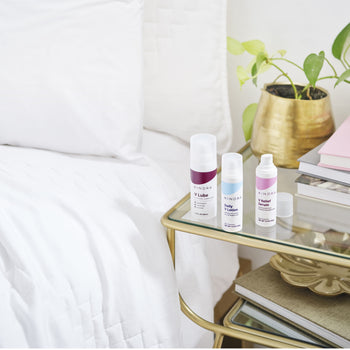Vaginal odor is one of the most common concerns people bring up with their healthcare providers—and one of the least openly talked about. Here’s the truth: every vagina has a scent, and in most cases, that scent is completely normal. But when odor changes suddenly or feels stronger than usual, it can cause understandable worry.
So, what causes vaginal odor? How do you know when it’s part of your body’s natural rhythm, and when it might signal an imbalance? Let’s break down the science, explore common causes, and share safe, empowering solutions for feeling balanced and confident.
Causes of Vaginal Odor: The Science Explained
The Vaginal Microbiome and pH Balance
Your vagina is a finely tuned ecosystem, known as the vaginal microbiome. Billions of bacteria live here, and most of them are “good” bacteria called Lactobacillus. These helpful microbes produce lactic acid, which keeps the vaginal pH balance slightly acidic (between 3.8 and 4.5).
This acidic environment prevents harmful bacteria and yeast from overgrowing. The byproducts of Lactobacillus—like lactic acid, fatty acids, and hydrogen peroxide—contribute to a natural, mild odor that’s typically musky or tangy. In fact, many people wonder: what does healthy vaginal odor smell like? The answer is that a subtle scent is normal, and no two bodies smell exactly the same.
When Lactobacillus levels drop, the vaginal environment becomes less acidic, allowing anaerobic bacteria to thrive. This shift is one of the main causes of vaginal odor, especially in conditions like bacterial vaginosis.
Vaginal Odor During Periods, Ovulation, and Menopause
Hormones also play a big role in how your vagina smells.
-
During your period: Menstrual blood has iron, which creates a temporary metallic scent.
-
During ovulation: Rising estrogen levels increase cervical mucus. More discharge can make odor more noticeable, but it’s still normal.
-
During perimenopause and menopause: As estrogen levels decline, the vaginal lining becomes thinner and less acidic. Fewer Lactobacillus bacteria thrive in this environment, making vaginal odor after menopause more common.
How Diet, Sweat, and Stress Affect Vaginal Odor
Odor isn’t just about bacteria and hormones. Lifestyle factors matter too:
-
Sweat & exercise: The vulva has sweat glands, and sweat trapped in tight clothing can cause vaginal odor after exercise.
-
Diet: Foods like garlic, onions, and asparagus may temporarily influence body odor, including vaginal scent.
-
Stress: Cortisol and other stress hormones can affect the immune system and microbiome, sometimes leading to subtle odor changes.
-
Sex: Vaginal odor after sex can be influenced by semen’s higher pH, which temporarily disrupts the vaginal environment.
Vaginal Odor vs Infection: When to See a Doctor
Not all odor is part of the healthy spectrum. Sometimes it signals an imbalance or infection:
-
Bacterial vaginosis (BV): The most common cause of vaginal odor. BV produces a strong, fishy smell along with thin, grayish discharge.
-
Yeast infection: Usually linked with itching and thick, white discharge, but may also cause odor.
-
Trichomoniasis (an STI): Causes a foul-smelling, frothy discharge.
-
Forgotten tampon or menstrual cup: Retained products can quickly cause strong, unpleasant odor and require medical removal.
If you’re unsure whether you’re experiencing normal vaginal odor vs infection, check in with a healthcare provider. Strong, persistent odor—especially if paired with itching, burning, or unusual discharge—warrants evaluation.
How to Get Rid of Vaginal Odor Safely
Instead of trying to mask odor with perfumes or douching (which can make things worse), focus on healthy, science-backed ways to support balance:
1. Use a Gentle, pH-Balanced Cleanser
The vagina itself is self-cleaning, but the vulva benefits from gentle cleansing. Skip harsh soaps and fragranced washes.
- Try Kindra’s Soothe Bath Soak & Shower Gel, a sulfate-free, fragrance-free formula designed for sensitive skin. It’s a gentle wash for vaginal odor that refreshes without disrupting your microbiome.
Soothe Bath Soak & Shower Gel
2. Choose Breathable Fabrics
Synthetic fabrics and tight leggings can trap moisture. Cotton underwear and breathable fabrics help reduce sweat buildup and odor.
4. Freshen Up After Exercise
Sweat-related odor is common. Change out of damp workout clothes quickly and rinse off to prevent bacteria growth around the vulva.
5. Balance Vaginal pH with Boric Acid
For recurrent odor linked to pH imbalance, boric acid can be effective.
- Kindra’s Boric Acid Suppositories are a clinically backed solution many gynecologists recommend for BV-related odor or persistent imbalance. They work by restoring vaginal acidity, helping reduce odor at its root cause.
Boric Acid Suppositories
6. Avoid Douching and Over-Washing
Douching disrupts the vaginal microbiome and often worsens odor by killing protective bacteria. Stick with gentle external care only.
7. Track Your Cycle
Notice when odor changes—around your period, after sex, or during stressful weeks. This can help you recognize your body’s healthy patterns versus signs of imbalance.
Breaking the Stigma Around Vaginal Odor
Let’s be clear: having vaginal odor does not mean you’re “dirty.” Vaginal scent is natural, and variations in smell are influenced by hormones, lifestyle, and microbiome health—not personal hygiene.
The stigma around odor has fueled harmful products like harsh douches and perfumes that often do more harm than good. Instead, focus on body literacy, self-compassion, and supportive solutions like Kindra’s Soothe Bath Soak & Shower Gel or Boric Acid Suppositories when needed.
The Empowered Takeaway
Your vagina is an intelligent, self-cleaning organ that’s designed to keep itself healthy. Vaginal odor is part of that process, and in most cases, it’s completely normal.
When odor does signal imbalance, you have safe, effective options to restore comfort—without shame. From balancing your microbiome with boric acid to practicing gentle vulvar care with pH-balanced products, you can feel fresh and confident every day.
Because freshness doesn’t mean eliminating odor—it means achieving balance. Trust your body, support it kindly, and never let stigma stand in the way of your self-care.














